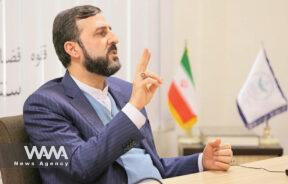Iran’s Ambassador to the UN: Gaza Ceasefire Must Become a Sustainable Solution
WANA (Jan 21) – Amir Saeid Iravani, Iran’s Ambassador and Permanent Representative to the United Nations, emphasized during a UN Security Council meeting on Gaza that while the ceasefire is a welcome step, it must evolve into a permanent and sustainable solution.
Speaking at the meeting on Palestine on Monday, Iravani stated that achieving this requires the complete withdrawal of Israeli forces, uninterrupted humanitarian aid delivery, and the development of a comprehensive reconstruction plan for Gaza.
The senior Iranian diplomat added, “Israel’s reluctance to fully withdraw and its insistence on maintaining security control over Gaza undermines these efforts and perpetuates instability. The Security Council must adopt a unified and decisive stance to defend Gaza’s territorial integrity.”
He further stated that the international community should prioritize maintaining UNRWA’s mission and ensuring sustainable and predictable funding to support Palestinian refugees. Addressing the growing violence in the West Bank, including settler attacks, which pose serious threats to peace and security, also requires immediate and decisive action.
Below is the full statement delivered by Amir Saeid Iravani, Iran’s Ambassador and Permanent Representative to the United Nations, at the UN Security Council meeting on “The Situation in the Middle East, Including the Question of Palestine”:
In the Name of Allah, the Most Compassionate, the Most Merciful
Mr. President,
We extend our gratitude to Algeria for organizing this important meeting. The Islamic Republic of Iran takes this opportunity to congratulate the courageous people of Palestine, particularly in Gaza, and all supporters of the Palestinian resistance worldwide on this significant victory. The agreement on the Gaza ceasefire symbolizes the bravery, unity, and resilience of the Palestinian people, who have endured endless suffering, including genocide and forced displacement.
In this context, I wish to highlight the following points:
First, Gaza remains at the center of a deep humanitarian crisis. This tragedy has exposed the double standards, moral failings, and inaction of the international community and the Security Council. The apartheid regime’s crimes are shocking: families have been completely wiped out, hospitals and schools destroyed, and vital infrastructure obliterated. The siege on Gaza has turned the lives of over two million people into a daily struggle for survival, depriving them of food, water, medicine, and electricity. These actions constitute collective punishment on an unimaginable scale.
Second, while the ceasefire is a welcome step, it must transform into a permanent and sustainable solution. This necessitates the complete withdrawal of Israeli forces, the unimpeded delivery of humanitarian aid, and the implementation of a comprehensive reconstruction plan for Gaza. Israel’s unwillingness to fully withdraw and its insistence on retaining security control over Gaza weakens these efforts and perpetuates instability. The Council must take a unified and resolute stand to protect Gaza’s territorial integrity. Furthermore, the international community must prioritize UNRWA’s mission and ensure sustainable and predictable funding to support Palestinian refugees. Combating the escalating violence in the West Bank, including settler attacks that pose serious threats to peace and security, demands immediate and decisive measures.
Third, the heinous crimes committed by the Israeli regime in Gaza—including mass killings of civilians, destruction of vital infrastructure, and the forced displacement of entire communities—are acts of genocide, war crimes, and crimes against humanity. These crimes cannot be overlooked after the ceasefire; accountability and prosecution are imperative. Achieving justice and preventing the recurrence of such atrocities require uncompromising accountability.
The Security Council must resist the propaganda of Israel’s terrorist regime, which seeks to divert attention from core issues.
Fourth, Israel must adhere to its ceasefire commitment with Lebanon, immediately cease violating Lebanon’s sovereignty, and withdraw its forces from southern Lebanon within 60 days of the ceasefire agreement. The Security Council must take a firm stance and monitor the full and precise implementation of the ceasefire. Similarly, Israel’s occupation of the Golan Heights violates the 1974 Disengagement Agreement and UN Resolution 497, which declared its annexation illegal.
Finally, resistance movements across the region are a legitimate response to decades of occupation, aggression, and expansionist policies by Israel. The Islamic Republic of Iran reiterates its unwavering support for the Palestinians’ right to self-defense and resistance in accordance with international law.
Thank you.












